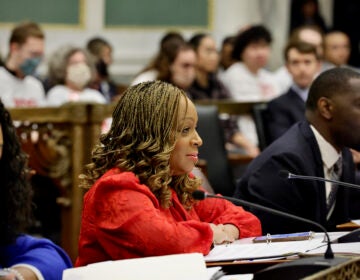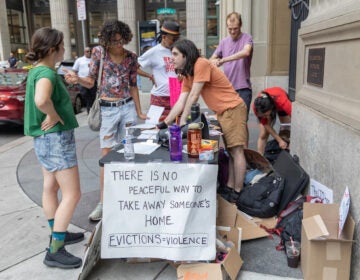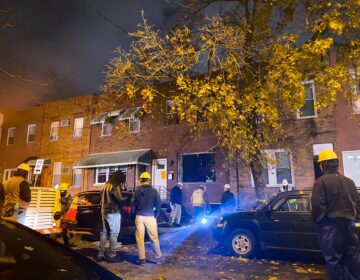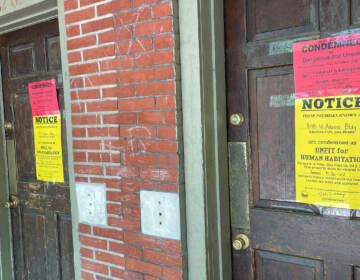Philly’s controversial for-profit eviction system could shut down in the coming weeks
The Landlord and Tenant Office may not have the insurance it needs to continue operating.
Listen 0:58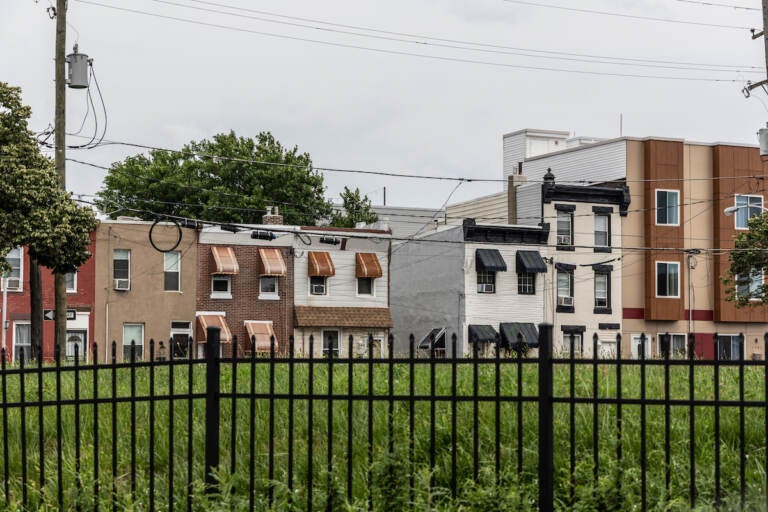
Rowhouses in Philadelphia’s Port Richmond neighborhood. (Kimberly Paynter/WHYY)
Have a question about Philly’s neighborhoods or the systems that shape them? PlanPhilly reporters want to hear from you! Ask us a question or send us a story idea you think we should cover.
Philadelphia’s embattled for-profit eviction system could soon grind to a halt.
The Landlord and Tenant Office, which performs the majority of the city’s evictions, is struggling to secure the insurance it needs to continue operating, according to a letter reviewed by WHYY News.
The office’s policy expires at the end of September. If it cannot arrange new coverage by then, the LTO will no longer be able to accept work from landlords and will be forced to shut down, according to the letter sent out Monday by Marisa Shuter, the city’s landlord-tenant officer.
“I trust that we have provided all of you with a valuable service over the past years,” said Shuter, who has led the office since 2017.
A spokesperson for the LTO did not immediately respond to a request for comment.
The turmoil comes as the city prepares to implement new regulations for eviction officers. For the first time, they will have to be licensed by the city to perform court-ordered lockouts. Under the law, they must also have liability insurance of $2 million per incident and $4 million per year.
The requirements are part of the Angel Davis Eviction Accountability Bill. The measure was introduced after a string of shootings by deputy landlord-tenant officers, two of which landed tenants in the hospital.
Davis was shot in the head during an attempted lockout at a North Philadelphia apartment complex and continues to recover from a traumatic brain injury. Latese Bethea was shot in the leg during an eviction in Kensington. Both women are now suing Shuter and her office for negligence.
The shootings shut down the office temporarily and sparked renewed calls from elected officials and housing advocates to reform the Landlord and Tenant Office amid an ongoing affordable housing crisis. The measure, introduced by Councilmember Kendra Brooks, was the first legislative response at the city level.
The law will take effect in about eight months as some advocates continue to call for the LTO to be abolished.
Brooks, a renter and one of Council’s fiercest housing advocates, said Tuesday she is not surprised that Shuter’s office is having a hard time finding “someone willing to insure her dangerous for-profit eviction operation.”
“The Angel Davis Eviction Accountability Act sets a new and higher standard for private entities that conduct evictions in Philadelphia, and if Marisa Shuter is unable to meet that standard, then her office should not be conducting evictions. Every other municipality in the state of Pennsylvania operates without allowing private entities to conduct evictions. I am confident that Philadelphia can find a way to do the same,” said Brooks in a statement.
Affordable housing advocate Asantewaa Nkrumah-Ture agreed. She helped launch the Justice 4 Angel Davis Now Campaign, a grassroots group that formed after Davis was shot that has pushed for the end of the Landlord and Tenant Office.
“The LTO eviction program has acted as a for-profit, mercenary outfit for landlords for way too long. We look forward to it permanently ending, that all tenants continue to organize for their own protection and self-empowerment,” said the campaign in a statement.
It’s unclear what happens if Shuter shuts down her business. Under state law, the president judge of Municipal Court is authorized to appoint a landlord-tenant officer, meaning the for-profit system could potentially continue under new leadership.
Shuter’s letter states that the office will stop accepting new writs of possession on Aug. 12. The document is a court order that landlords can receive after winning an eviction case against a tenant. They are designed to warn tenants that a lockout is coming.
After Aug. 12, the court “will be directing your filings to the Sheriff’s Office,” said Shuter.
The Philadelphia Sheriff’s Office is the only other entity that performs lockouts in the city. A spokesperson said she did not know about the letter.
Paul Cohen, general counsel for HAPCO Philadelphia, the city’s largest advocacy group for landlords and property managers, said he hopes the sheriff’s office is equipped to do the job if it has to take on more evictions.
“The hope is that the sheriff’s office will be able to handle it. If they can, that will be awesome. If they can’t that will be a problem,” said Cohen.
 This story is a part of Every Voice, Every Vote, a collaborative project managed by The Lenfest Institute for Journalism. The William Penn Foundation provides lead support for Every Voice, Every Vote in 2024 and 2025 with additional funding from The Lenfest Institute for Journalism, Comcast NBC Universal, The John S. and James L. Knight Foundation, Henry L. Kimelman Family Foundation, Judy and Peter Leone, Arctos Foundation, Wyncote Foundation, 25th Century Foundation, and Dolfinger-McMahon Foundation.
This story is a part of Every Voice, Every Vote, a collaborative project managed by The Lenfest Institute for Journalism. The William Penn Foundation provides lead support for Every Voice, Every Vote in 2024 and 2025 with additional funding from The Lenfest Institute for Journalism, Comcast NBC Universal, The John S. and James L. Knight Foundation, Henry L. Kimelman Family Foundation, Judy and Peter Leone, Arctos Foundation, Wyncote Foundation, 25th Century Foundation, and Dolfinger-McMahon Foundation.
To learn more about the project and view a full list of supporters, visit www.everyvoice-everyvote.org. Editorial content is created independently of the project’s donors.

Get daily updates from WHYY News!
WHYY is your source for fact-based, in-depth journalism and information. As a nonprofit organization, we rely on financial support from readers like you. Please give today.




